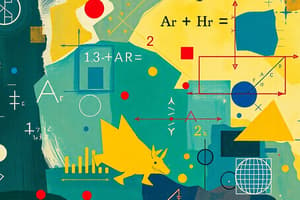Podcast
Questions and Answers
Which of the following is NOT one of the properties of basic operations in arithmetic?
Which of the following is NOT one of the properties of basic operations in arithmetic?
- Factorial (correct)
- Commutative
- Associative
- Distributive
The Pythagorean theorem applies only to right triangles.
The Pythagorean theorem applies only to right triangles.
True (A)
What does the term 'mean' refer to in statistics?
What does the term 'mean' refer to in statistics?
Average
The fundamental theorem of algebra states that every non-constant polynomial has at least one complex _____.
The fundamental theorem of algebra states that every non-constant polynomial has at least one complex _____.
Match the following mathematical concepts with their definitions:
Match the following mathematical concepts with their definitions:
Flashcards are hidden until you start studying
Study Notes
Key Areas of Mathematics
-
Arithmetic
- Basic operations: addition, subtraction, multiplication, division.
- Properties: commutative, associative, and distributive.
- Order of operations (PEMDAS/BODMAS).
-
Algebra
- Variables and constants.
- Expressions and equations.
- Solving linear equations and inequalities.
- Quadratic equations: factoring, quadratic formula.
-
Geometry
- Basic shapes: squares, rectangles, circles, triangles.
- Properties: perimeter, area, volume.
- Theorems: Pythagorean theorem, properties of angles.
- Coordinate geometry: distance formula, midpoint formula.
-
Trigonometry
- Basic functions: sine, cosine, tangent.
- Relationships in right triangles.
- Unit circle and radians.
- Trigonometric identities.
-
Calculus
- Limits and continuity.
- Derivatives: definitions, rules (product, quotient, chain).
- Integrals: definite and indefinite integrals, techniques of integration.
- Applications in physics and engineering.
-
Statistics
- Descriptive statistics: mean, median, mode, range.
- Probability: basic concepts, independent and dependent events.
- Distributions: normal distribution, binomial distribution.
- Inferential statistics: hypothesis testing, confidence intervals.
-
Discrete Mathematics
- Set theory: unions, intersections, subsets.
- Graph theory: vertices, edges, paths, cycles.
- Combinatorics: permutations, combinations, binomial theorem.
- Logic: statements, truth tables, logical operators.
-
Number Theory
- Prime numbers and composite numbers.
- Divisibility rules.
- Greatest common divisor (GCD) and least common multiple (LCM).
- Modular arithmetic.
Key Concepts and Theorems
- Fundamental Theorem of Algebra: Every non-constant polynomial has at least one complex root.
- Euclid's Algorithm: Method for finding the GCD of two integers.
- Mean Value Theorem: A function that is continuous on a closed interval and differentiable on an open interval has at least one point where the derivative is equal to the average rate of change.
Study Tips
- Practice problem-solving regularly.
- Visualize concepts through graphs and diagrams.
- Utilize online resources and tutoring if needed.
- Group study can aid in understanding complex topics.
- Regular revision is key to retaining mathematical concepts.
Key Areas of Mathematics
-
Arithmetic: Essential operations include addition, subtraction, multiplication, and division. Operations follow properties such as commutative, associative, and distributive. Order of operations can be remembered using PEMDAS/BODMAS.
-
Algebra: Involves variables and constants, expressions, and equations. Focus on solving linear equations and inequalities, as well as quadratic equations using factoring methods or the quadratic formula.
-
Geometry: Study of basic shapes (squares, rectangles, circles, triangles) and their properties, including perimeter, area, and volume. Key theorems include the Pythagorean theorem and properties of angles. Coordinate geometry includes calculating distances and midpoints.
-
Trigonometry: Core functions involve sine, cosine, and tangent, focusing on their relationship within right triangles. Understanding the unit circle and radian measures is crucial, alongside memorizing trigonometric identities.
-
Calculus: Foundations include limits and continuity. Derivative concepts include definitions, and various rules such as product, quotient, and chain rules. Integral calculus involves both definite and indefinite integrals, plus various techniques of integration and applications in physics and engineering.
-
Statistics: Includes descriptive statistics such as mean, median, mode, and range. Key probability concepts cover independent and dependent events with a focus on normal and binomial distributions. Inferential statistics encompass hypothesis testing and constructing confidence intervals.
-
Discrete Mathematics: Encompasses set theory (unions, intersections, subsets), graph theory (vertices, edges, paths, and cycles), and combinatorics (permutations, combinations, binomial theorem). Logic covers statements, truth tables, and logical operators.
-
Number Theory: Focus on prime vs. composite numbers and their divisibility rules. Key concepts include the greatest common divisor (GCD), least common multiple (LCM), and applications of modular arithmetic.
Key Concepts and Theorems
-
Fundamental Theorem of Algebra: Asserts that every non-constant polynomial possesses at least one complex root, highlighting the connections between algebra and complex numbers.
-
Euclid's Algorithm: A systematic method for determining the greatest common divisor (GCD) of two integers, foundational in number theory.
-
Mean Value Theorem: States that for a continuous function on a closed interval, which is differentiable on an open interval, there exists a point where the derivative equals the average rate of change, linking calculus with geometry.
Study Tips
-
Regularly practicing problem-solving enhances skill retention and proficiency.
-
Utilize graphs and diagrams to visualize complex mathematical ideas, aiding comprehension.
-
Seek online resources and tutoring for additional assistance when essential topics become challenging.
-
Group study sessions promote collaborative learning, explaining concepts to peers to reinforce understanding.
-
Consistent revision is crucial for cementing knowledge and ensuring long-term retention of mathematical concepts.
Studying That Suits You
Use AI to generate personalized quizzes and flashcards to suit your learning preferences.




